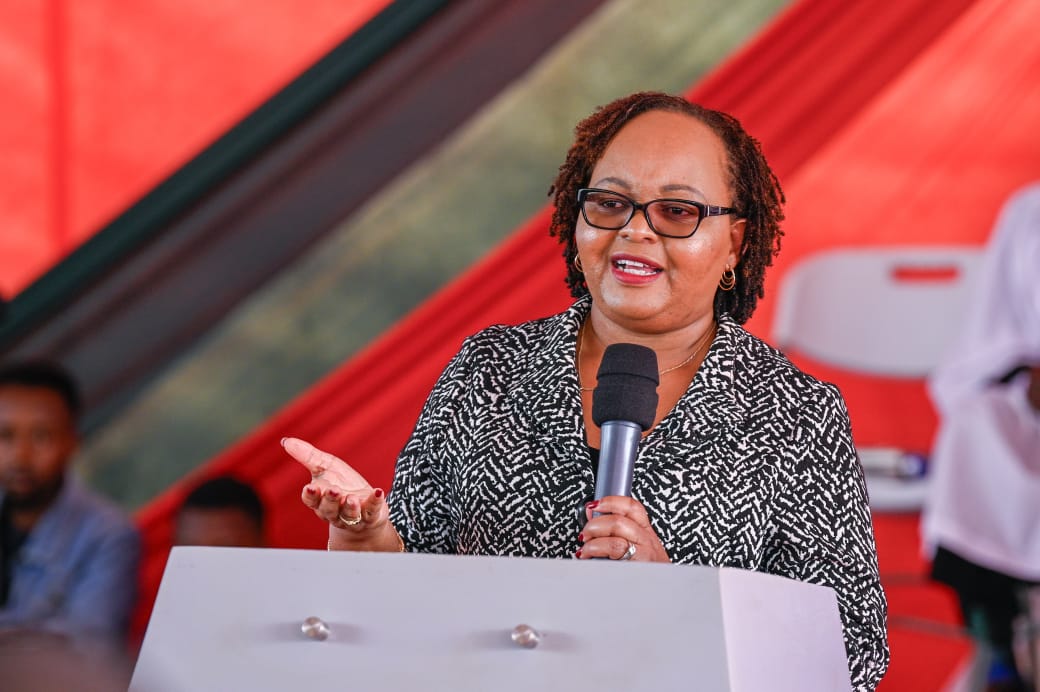
 Kirinyaga Governor Anne Waiguru addressing mourners at Kiaragana during a burial service.
Kirinyaga Governor Anne Waiguru addressing mourners at Kiaragana during a burial service.The government, in a gazette notice dated July 28, announced it would allow the importation of Grade 1 Milled White Rice by December 31 this year.
But the leaders who spoke in various events on Thursday asked the national government to prioritise buying locally produced rice before allowing imports.
Local farmers produce about 230,000 tonnes against an annual consumption of one million tonnes, leaving a deficit of about 770,000 tonnes.
Despite this, local farmers continue to struggle to sell their produce as rice stocks mount in their stores.
In May this year, Mwea Rice Growers Society chairperson Muriuki Ndege told journalists the Sacco had 5,000 tonnes of rice in its stores, following the state’s decision to import another batch of 500,000 tonnes in May last year, flooding the market.
Governor Anne Waiguru said the rice imports are still circulating in the market, making it impossible for farmers to sell their produce.
"We have seven stores and only one is not stocked. We have a stock worth more than Sh500 million that we don't know what to do with".
Waiguru said while it is understandable the country does not produce enough rice to meet the national demand, it is only imperative that priority is given to local rice farmers.
She warned the planned importation of 500,000 tonnes of milled white rice announced in a notice by National Treasury CS John Mbadi would hurt Mwea rice farmers.
“Before you import rice from outside, just note that our stores are full with rice and we ask that you first buy that one and then import to meet the deficit,” she asserted, noting that as a governor, she cannot sit back and watch farmers from the county suffer.
The governor, who spoke at Kiaragana in Ndia during the funeral of Tharaka Nithi Governor Muthomi Njuki’s father-in-law, said importation of duty free rice should only be allowed when the local produce is exhaustively consumed.
Kirinyaga is the leading rice producer in Kenya and hosts Mwea Irrigation Scheme that spans around 30,000 acres.
The scheme produces about 200,000 tonnes that fetch farmers close to Sh15 billion annually and supplies more than 60 per cent of domestic rice, largely contributing to the country’s food security goals.
The county administration has over the years supported farmers to increase production through the Wezesha Kirinyaga initiative.
The programme has so far supported more than 100,000 households with subsidised farm inputs, agricultural mechanisation, value addition, marketing, value addition and extensive agricultural technical support.
The support has led to doubling of production in the various agricultural value chains such as rice, tomatoes, avocado, fish and dairy, among others.
Maara MP Kareke Mbiuki said it is unfortunate that farmers have been toiling all year round to produce rice only for it to remain in their stores.
"When we see duty free rice in the country, yet our farmers have excess rice in their stores, it's very surprising," he said.
He said as MPs, they will consider petitioning the government to stop the annual imports to reprieve farmers.
Kenya Seed Company chairperson Wangui Ngirichi also took issues with the imports, saying they will negate the gains achieved in the local sector.
"Millers stores are full to capacity. What will happen if more rice is imported? The government should ensure farmers get at least Sh85 per kilogramme".
Simon Maina, a farmer, said the government has abandoned farmers who have been working tirelessly on their farms only for cheap imports to ruin their already dampened market.
Instant Analysis
Local farmers produce about 230,000 tonnes against an annual consumption of one million tonnes, leaving a deficit of about 770,000 tonnes. The government announced in a gazette notice dated July 28, 2025, that it would allow the importation of Grade 1 Milled White Rice by December 31, 2025. Kirinyaga is the leading rice producer in Kenya and hosts Mwea Irrigation Scheme that spans around 30,000 acres.












